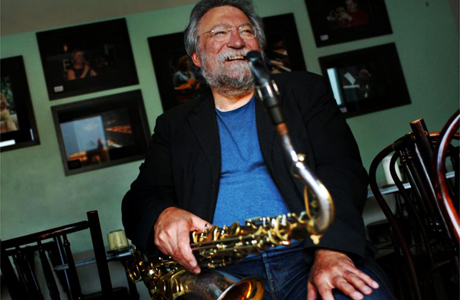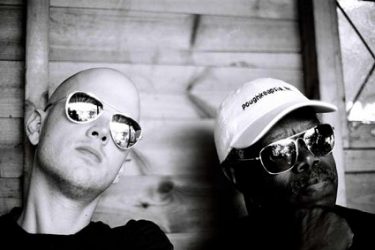“Can you think of a better saxophone player? I can’t. He is a giant.” Robert Wyatt
Evan Parker is one of the great saxophone players, pushing the instrument into uncharted waters since his emergence in the late 1960s. To mark his 70th year, Parker curates a week of performances at the Vortex and Cafe Oto, performing with some of the artists he’s worked so closely with over the years. Both venues are close to Parker’s heart, having built reputations as spaces where musicians can experiment and take risks, and for this week they present a very special programme of concerts on alternating nights.
Evan Parker / Chris Corsano / John Edwards (trio)
Evan Parker / Joe McPhee (duo)
Evan Parker / Chris Corsano / Joe McPhee / John Edwards (quartet)
Evan Parker
Free improvised music has accounted for most of Parker’s activities over the last forty years, whether playing solo or in groups, but both jazz and art music composers have also deployed the arresting physicality of his sound as a contrasting and energising element. His saxophones have been heard inside jazz big bands led by Kenny Wheeler, Chris McGregor, Barry Guy, Stan Tracey and Charlie Watts and in the chamber music of Michael Nyman, Gavin Bryars, Frederic Rzewski and others.
Joe McPhee
Born in Miami in 1939, Joe McPhee was playing the trumpet by the time he was eight years old. From the late 1960’s onward, he worked a variety of instruments (all kinds of saxophones, clarinets, trombone, piano). Influenced by John Coltrane, Albert Ayler and Ornette Coleman (pivotal figure in his beginnings as a musician), Joe McPhee is one of the most relevant free and transgressive spirits in reshaping the forms and vocabularies of jazz, and of other creative areas that he helped become adjacent to it. Working early on with some of the most forward thinking musicians of his generation, people with like-minded aesthetical and spiritual concerns, towards the vibrant and the unknown, not only did he play with the cream of the crop of the most clairvoyant European and American jazz, but he also collaborated with the vanguard of electronic music in the 1970’s, as is the case with Pauline Oliveros’ Deep Listening Band, a pioneer of continuous music. McPhee’s curriculum contains more than half a century’s worth of albums, several under his own name released by the HatHut label, which was initially conceived with the exact purpose of releasing his music. He worked with an endless cast of seminal artists over the last four decades, and is today, as much as he was in the past, a major reference as to what new grounds jazz music is treading.
Chris Corsano
One very significant characteristic of some of the most creative music forms of the early stages of the XXI century is, unlike jazz-rock fusions of the 70’s, the fully developed coalition of 60’s free-jazz, and spiritually aligned libertary vocabularies. We saw the rock, psychedelia, or minimalism merge with the words of John Coltrane and Albert Ayler, giving birth to new lexical avenues of non-idiomatic forms of expression. Chris Corsano, as a drummer, is probably the first true example of this “total music”. Having collaborated with such distinguished musicians as Paul Flaherty, Thurston Moore or Björk, he has developed a percussive language of extraordinary amplitude and infinite resources. He is capable of generating narrative out of permanent ecstasy, leading the eternal cry of sax players and blowers of the 60’s to its logical consequence – a supreme continuous howl, marveling us with the resonances and with all the plastic/acoustic possibilities of the skin on his kit. Capable of interacting in the most disparate creative and vocabulary settings (he’s got a wide interest in many musical forms), he never ceases to be profoundly affirmative and imposing of his language, and being an absolute and charismatic virtuoso, he simultaneously is one of the most noble and generous improvisers of the few last decades.
John Edwards
John Edwards is a true virtuoso whose staggering range of techniques and boundless musical imagination have redefined the possibility of the double bass and dramatically expanded its role, whether playing solo or with others. Perpetually in demand, he has played with Evan Parker, Sunny Murray, Derek Bailey, Joe McPhee, Lol Coxhill, Peter Brötzmann, Mulatu Astatke and many others.
“I think John Edwards is absolutely remarkable: there’s never been anything like him before, anywhere in jazz.” – Richard Williams, The Blue Moment


